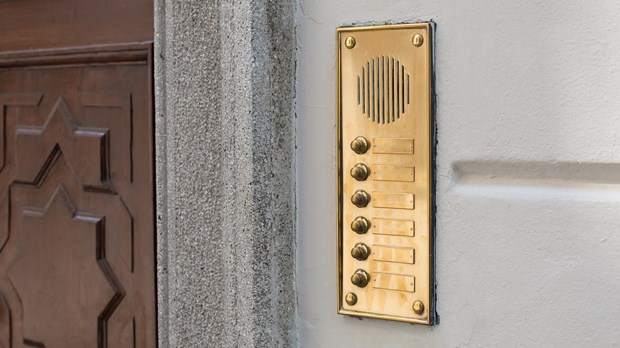Love Your Neighbor (in 4C) as Yourself

I love my apartment. I really and truly love it. Sometimes I’ll be walking from one room to another and I’ll stop in the doorway, lean against the frame, and soak in every detail of the room in front of me. These rooms, these walls, are the purest expressions of the lives my roommate and I have built over our three years here, the women we have become, and the place from which we will build toward our futures.
Home is special. It’s important. It’s the place we return every night, the place that will be waiting for us after all the other lights are out. Even though an apartment is often, as it is for me now, a temporary place, it’s no less a part of my reality than the forever home is for its family. And yet it has never occurred to me to think of this as a place for community.
It seems I’m not alone. According to a recent study conducted by Harris Interactive on behalf of Trulia, two-thirds of Americans say they like their neighbors, but only half even know their names. I’m not surprised. By the time I get home, I’m often tired from a long day, and the last thing I want to have to do is take the risk of entering into the complicated life of someone I might have nothing in common with except physical proximity. It feels even riskier to invest when I know that, like me, my neighbor has committed to stay only as far as the next 12 months.
Effortless Anonymity
Apartment life often feels transitional. We apartment dwellers tend to be childless, and more single than not, with unpredictable comings and goings. With so many people in such a small space, it can be easy to feel anonymous. It can be even easier to accept this anonymity in exchange for not having to make the effort to engage the people around us when we have our own lives to lead, our own places to be.
Nothing lasts, really. Neighbors come and go, even when they’re in houses. I grew up in an uncommonly stable neighborhood, on a cul-de-sac where many families stayed to raise their children together, where neighbors knew when a widow needed help shoveling and when a young family was sick and needed meals delivered. They, too, left, over time. A neighborhood isn’t defined by stability. It’s defined by its existence. It’s not a community we choose; it’s a community we’re a part of just by being where we are.
I believe this to be true. And yet when I cross paths with a neighbor at the mailboxes, or on the stairs, I tend to smile and look away, maybe throw out a comment or two on the weather or proximity to a major holiday, and return to the introvert sanctuary of my own apartment. I hear the shuffles and slams of lives happening just feet above and below me, and I rarely accept them into my own. This is easy. But it isn’t, I am beginning to realize, very biblical.
Created for Community
The Bible has a lot to say about neighbors. We are called over and over again to , and Ephesians 4:25 adds: “So stop telling lies. Let us tell our neighbors the truth, for we are all parts of the same body.” The triune nature of God, and the establishment of the church itself, is a testament to the fact we were created for community. When we’re a good neighbor, we care about the well-being of those around us. We’re attuned to their needs and looking for ways to help. We make sure they know they’re known and loved by God by knowing and loving them ourselves.
There are entire ministries built around this idea. For example, Apartment Life is a faith-based nonprofit that has set out to “be the change within apartment communities and exists to foster environments where apartment residents can build quality relationships with their neighbors through a renewed focus on community.” They commission teams to serve as community builders in apartment buildings in more than 20 cities across the United States, bringing together residents to remind them of and draw them into the community that surrounds them.
So how do we do this?
Choosing an Outward Gaze
It starts with being aware of your apartment building as a neighborhood. I tend to think of my apartment building as “the place where I live.” But it’s also the place where at least 20 other people live. When I think of it as the place we all live, I realize how selfish I often am in thinking about these people as extras in the story of my life. It’s a constant struggle of life, and particularly of the Christian life, to turn our gaze continually outward, to see and to love people as God sees them and loves them. It is easy to do this in the communities I choose; it is less so in those I didn’t. What better way to practice loving my neighbor, as I am so directly called to do, than with my actual neighbors?
Being a neighbor involves more than just saying hello or even taking a general interest in each other’s lives when we pass in the hall—these are great places to start, but being a true neighbor involves inviting people into your home. This is a physical demonstration that you’re inviting someone into your life, to sit down and get comfortable and share a conversation, or a meal, in a way that takes up physical and emotional space in each of your lives. It’s not bound by your need to be somewhere else, or to kill time while you complete a separate, unrelated task. It’s carving out a space specifically for this person.
When you spend time with someone, you get to know who they are, not just their likes and dislikes and general interests, but their hopes and dreams, their desires and needs. An apartment building can make it much easier to tell when someone is struggling, when someone is sick, when someone is having car trouble. To be a neighbor is to pay attention to these things, and to step in to help. We are called to carry each other’s burdens (), and as apartment neighbors we are well positioned to see the needs people might not feel comfortable expressing, and to help meet them before they do.
I haven’t always been perfect at this. I’ve definitely failed more than I’ve succeeded. But I have had the joy of living above, below, and next to the kind of neighbors who bang on the ceiling to call me up just to talk, who invite me over to watch TV with their friends, who drive me to work when my car is in the shop. I have begun to learn to see not just my apartment and the things in it but also the people who share this space as parts of the life I am living and the woman I am becoming. And I really and truly love it.
Laura Leonard is managing editor of BuildingChurchLeaders.com. She lives in the Chicago suburbs, far away from her family in Philadelphia but close to a wonderful church and friend community God has graciously provided. Follow her on Twitter at @lmarieleonard.
Read more articles that highlight writing by Christian women at ChristianityToday.com/Women
 Read These Next
Read These Next

 Jesus Doesn't Call Us to Merely Be NiceThe life-changing challenge from the Good Samaritan
Jesus Doesn't Call Us to Merely Be NiceThe life-changing challenge from the Good Samaritan Your Child Today: Late ElementaryCoping with Cliques
Your Child Today: Late ElementaryCoping with Cliques









 Homepage
Homepage